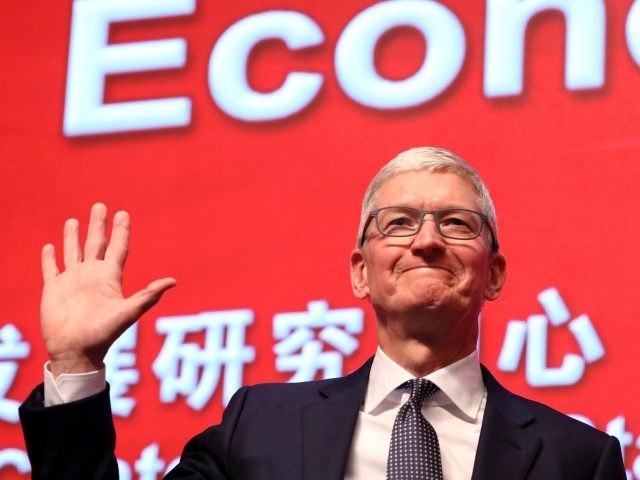Apple CEO Tim Cook was the “architect” of the multinational corporation’s plan to outsource most of its production to China, ushering what Bloomberg Businessweek calls an “era of outsourced manufacturing and made-to-order products.”
A profile published in Bloomberg Businessweek details Cook’s slick political maneuvering and an outsourcing scheme that has driven Apple’s market value to $2.3 trillion while gutting its U.S. manufacturing base — and encouraging others to do so — for cheap labor in China, India, and Vietnam.
Bloomberg Businessweek reports:
As everyone at the dinner well knew, the idea of mass-producing an iPhone, or any advanced consumer electronics, in a domestic factory was an exceptionally tall order. The big Asian contract manufacturers, especially Apple Inc.’s main partner, Foxconn, had built city-size factories in China with armies of hundreds of thousands of skilled laborers. None of that scale existed in the U.S. Chinese factory employees generally worked much longer hours, for a fraction of what even the lowest-paid American workers make. “I’m not sure, short of dictatorial practices, that you could ever make that work,” says John Riccitiello, another Silicon Valley executive who witnessed the exchange between Cook and Biden. [Emphasis added]
Biden’s question put Cook, who’d become Apple’s CEO the previous August, in an awkward position. He was the architect of the strategy to outsource Apple’s production to China, a trend of increasing concern for the Obama administration. But Cook was also, as it turned out, extremely effective at deflecting political pressure. He was certainly more diplomatic than his old boss. Obama once asked [Steve] Jobs the same question, and Jobs’s characteristically blunt reply landed on the front page of the New York Times: “Those jobs aren’t coming back.” Cook, though, was smooth and noncombative — so much so, in fact, that Riccitiello can’t recall exactly what he said to Biden. By the end of that year, Cook announced a small yet politically significant shift. Apple, he said, would start making some Macs in the U.S. [Emphasis added]
And then, Apple’s reliance on China only grew. You might think its ever-tighter embrace with the country would have put Cook in a worse political position after Donald Trump was elected president in 2016 based on a campaign marked by anti-China rhetoric, threats of a trade war, and promises to bring jobs lost to Shenzhen back to American shores — not to mention challenges of the coronavirus pandemic and rising antitrust fervor during his term in office. Strangely, though, Apple thrived under Trump. In August 2018, the company’s market value reached $1 trillion; 24 months later, even as Trump railed on the campaign trail that “these stupid supply chains” in China should move home, it surpassed $2 trillion. [Emphasis added]
Apple’s manufacturing was not always based overseas. Throughout the 1980s and early 1990s, Apple employed thousands of Americans at manufacturing plants in Texas, Colorado, and California. By the mid-1990s, though, Apple started moving its U.S. production to plants in Singapore and Ireland.
In 2004, Apple closed its last U.S. manufacturing plant, laying off 235 American workers. Today, most of Apple’s supply chain is based in China and other foreign countries. A 2017 report from Yahoo Finance found that Apple supports about 4.8 million jobs in China and its Chinese supply chain, alone, has more than a million workers.
Cook, as Bloomberg Businessweek notes, sped up the company’s outsourcing to China by shifting its laptop and webcam production there.
Even amid the Chinese coronavirus crisis, Cook has ensured Apple remains fully operational in China, according to Bloomberg Businessweek by chartering private flights to and from the country so that employees could manage production.
Already, the Biden administration is avoiding criticism of multinational corporations like Apple which have continued doing business in China despite a record of human rights abuses and subpar labor standards.
Last week, when Breitbart News’ Charlie Spiering asked if President Joe Biden supported American companies speaking out against the Chinese Communist Party as they continue to do business in China, White House press secretary Jen Psaki dodged the question.
White House“The president’s been outspoken, as he was, in his conversation with the president of China about American values,” Psaki said.
“He’s the president of the United States; he’s conveying what he feels our values are,” Psaki continued. “And he conveys that to anyone he has conversations with whether it’s publicly or privately to companies or to leaders of other countries.”
Last year, Apple successfully avoided U.S. tariffs on Chinese imports for some of its products thanks to Cook’s close working relationship with the Trump administration. In March 2020, the administration gave a tariff waiver for Apple Watch, ensuring that the company avoided a 7.5 percent duty while importing its smartwatches from China to the U.S. market.
In December 2019, Apple avoided tariffs on its iPhones that it makes in China after the Trump administration announced the first phase of a trade deal.
While hundreds of thousands of American small and medium-sized businesses have been forced to permanently close as a result of the coronavirus crisis, multinational corporations like Apple have netted record profits with their increasing market power and monopolies over various industries.
Apple, between October and December 2020, reported more than $111 billion in revenue, an increase of more than 20 percent compared to the same time last year.
Around the same time, amid yet another surge in Covid-19 cases and continued economic uncertainty, the company reported revenue of $111 billion for the previous quarter, a record. Meanwhile, as tens of millions of Americans have been laid off from their jobs, Cook’s annual salary increased by nearly 30 percent in 2020 to $14.8 million.
John Binder is a reporter for Breitbart News. Email him at jbinder@breitbart.com. Follow him on Twitter here.

COMMENTS
Please let us know if you're having issues with commenting.